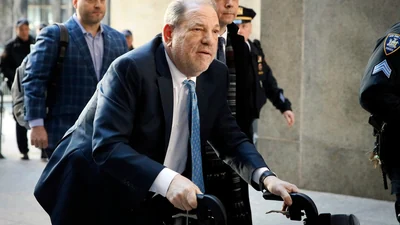NEWS
Breaking News:Harvey Weinstein hospitalised after cancer diagnosis, plans legal action against…

Weinstein accuses New York City of medical negligence and is contemplating legal action over his care, as he faces a retrial.
Harvey Weinstein, the disgraced Hollywood mogul serving time for multiple sex crimes, is back in the hospital while battling chronic myeloid leukemia. The 72-year-old has accused New York City officials of “medical negligence,” claiming he’s being denied adequate care while in custody. his team is reportedly considering legal action, alleging that the city’s refusal to keep him at Bellevue Hospital during his upcoming retrial risks his health.
Harvey Weinstein plans to sue NYC officials
Harvey Weinstein, whose initial conviction was partly overturned, now faces a retrial on two charges while battling a serious form of bone marrow cancer, diagnosed last October. His team, according to the Post, claims Weinstein isn’t receiving adequate medical care while in custody and is reportedly considering legal action against NYC Health + Hospitals/Bellevue.
The movie producer’s legal team argues that the decision to move him out of Bellevue Hospital ahead of his retrial represents a serious failure, potentially putting his health—and his ability to participate fully in his defense—at risk. According to his rep, “this treatment suggests a broader agenda for a more sinister outcome through lawfare and inadequate healthcare.”
However, Weinstein clarified that he doesn’t hold the medical staff at Rikers Island, Correctional Health Services, or his doctors—whom he has “deep respect” for—responsible for his current situation.
Weinstein’s health history
Harvey Weinstein, who opposed the #MeToo movement, was convicted in February 2020 on charges of third-degree rape and first-degree criminal sexual act. He was then sentenced to 23 years in prison. Three years later, he was found guilty of a 2013 rape in Los Angeles and received an additional 16-year sentence. At the time of this conviction, his legal team expressed concern that his declining health might prevent him from serving his full sentence and that he would ‘likey’ die in prison.
In July of that year, Weinstein was transferred from a New York City jail to a hospital to receive treatment for various health issues, including severe complications from COVID-19 and pneumonia. He also required medical attention for diabetes, high blood pressure, spinal stenosis, and fluid buildup around his heart and lungs. In a more urgent turn of events, Weinstein was hospitalised for heart surgery in September.
The New York Court of Appeals ruled in April that testimony about Weinstein’s past behavior should not have been used in his initial trial, as it focused more on his character than proving intent for the crimes in question. Despite this, Weinstein still faces two additional criminal charges from an earlier indictment, where he has maintained a not-guilty plea.












